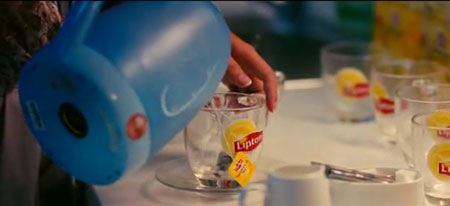Underhanded advertising in movies
|
|
|
Such product placements as tea, car, laptop and wine brands are too obvious in some Chinese films and television shows.Photo: Youku.com? |
For some films and television shows these days, the stars and story lines are taking second place to product placement, the sneaky modern method of advertising. Product placement, or imbedded marketing, has been estimated at being worth up to $10 billion a year in the US and it is now prospering in China.
Recent cinema blockbusters that have come under fire for overdoing placements include Feng Xiaogang's If You Are The One II and Zhang Yibai's Eternal Moment.
The original If You Are The One was a huge success at the Chinese box office and earned more than 300 million yuan ($45.7 million) two years ago. When the sequel opened in December last year, it was criticized for containing too many product placements.
The Xiaoxiang Morning Herald reported that the film contained 20 placements for vehicles, airlines, wine, credit cards, hotels and mobile phones. The subliminal advertising got in the way of the charms of the romantic comedy for many viewers.
Leading film critic Cheng Qingsong noted: "It is OK to have product placements but to have 20 in one film is really offensive to viewers."
Awkward and tactless
Apart from the number of placements, their presentation was also awkward and tactless. In If You Are The One II, the camera dwells for 50 seconds on star Shu Qi's Mercedes-Benz and one minute later, at a scene for a charity auction, the guests all drive up in different Mercedes-Benz models with the camera zooming in on the brand badges.
|
|
|
Such product placements as tea, car, laptop and wine brands are too obvious in some Chinese films and television shows.Photo: Youku.com? |
In Eternal Moment, to promote an electronics retailer, the lead actress becomes a saleswoman in a shop – a job totally unsuited to her education and upbringing. In another scene, when the lead actor is suffering from a high temperature, a hotel waitress gives him a dose of a patent medicine designed for stomach problems not for the flu or a cold and inquires: "Is your stomach feeling better now?"
Xu Zhenglin, the dean of the advertising faculty at the Shanghai University told the Global Times that some product placements in Chinese films were far too obvious.
"Directors should make product placements more subtle and reduce their time on screen. We have seen some very obvious product placements in recent films and shows, and this has made viewers wonder whether the advertisers have become the directors,"Xu said.
Xu said that a good product placement should last no longer than eight seconds. Spending too long on placements was unfair to the viewers. "Audiences who pay to see a film are forced to watch these placements."
Professor Huang Shengmin, the director of the Advertising School at the Communications University of China, told the Global Times that film and television audiences should never be aware of product placement.
|
|
|
Such product placements as tea, car, laptop and wine brands are too obvious in some Chinese films and television shows.Photo: Youku.com? |
Relevant to the plot
"Product placements should be relevant to the plot, and included in a natural, subtle way. Bad product placements harm the quality of the film or television program and can have a negative effect on the brands,"Huang said.
In the controversial 2010 CCTV Chinese New Year's Eve gala show, viewers suffered obvious and annoying product placements. In the skit 50 Kuai, the aprons the two performers wore during the segment carried the logo of a brand of cooking oil – even though the skit had nothing to do with oil.
Huang said the biggest problem was that China had no laws regulating product placement. "We lack regulations on product placements and we lack a system to evaluate the effect of this advertising."
Huang said product placements had advantages over traditional advertising. "Audiences are becoming more mindful of traditional advertisements and sometimes turn them off. Product placements have the advantage of targeting the audience that is attracted to these types of television programs or films."
However, Yue Yunsheng, a lawyer with the Beijing Yuecheng Law Firm, said that by using product placements, television and film producers could be violating the rights of viewers.
 0
0 









